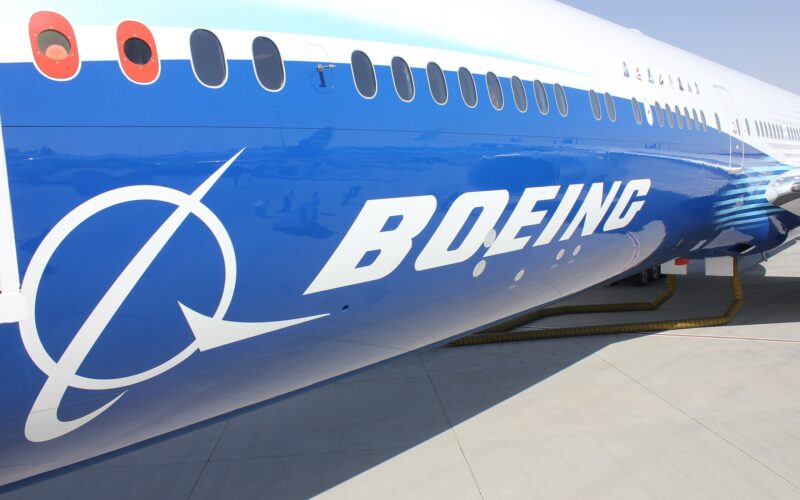Boeing has revealed the exact order split for specific types of aircraft, including the 737 MAXs and 777-8X, in its latest Orders & Deliveries filing.
The filings, which were updated as of July 31, 2023, showed that the United States-based planemaker has amassed a total of 363 net orders for the entire 777X family, split between eight for the 777-8X, 55 for the 777-8F, and 300 for the 777-9X. Gross orders were 43, 55, and 322, respectively.
In June 2023’s filings, the manufacturer disclosed that Emirates ordered 16 777Xs, despite the airline already having a backlog of 150 aircraft since its order for the type in November 2013. The order was firmed up in July 2014.
The Dubai International Airport (DXB)-based airline became one of the launch customers of the type during the Dubai Air Show in November 2013, when Boeing launched the program with a total of 259 “agreements from four customers across Europe and the Middle East”. Apart from Emirates, Etihad Airways, Lufthansa, and Qatar Airways were the other three.
According to ch-aviation.com data, Etihad Airways remains the only airline with orders for the 777-8X with orders for the 777-8X having placed eight orders for the aircraft type.
Boeing recently ‘stretched’ the 777-8X on its product page, editing the specifications of the aircraft with more capacity, range, and additional length. When compared to specifications still present in early January 2023, the 777-8X grew by 3 feet (0.9 meters), added 11 passengers to a typical two-class configuration, and had its estimated range was increased by 15 nautical miles (27.7 kilometers).
The aircraft can now typically seat 395 passengers in a two-class configuration, fly up to 8,745 nautical miles (16,190 kilometers), and its length is 232 feet and 6 inches (70.86 meters).
737 MAX split
The plane manufacturer also revealed the order split for the 737 MAX aircraft family, which is comprised of the 737 MAX-7, MAX-8, as well as the MAX-8-200, MAX-9, and MAX-10.
The 737 MAX-8 is by far the most popular model with more than 5,000 gross orders. Its higher-density derivative, the MAX-8-200, has 469 gross orders. Meanwhile, the second-most popular variant is the yet-to-be-certified 737 MAX-10, with 918 gross orders. The 737 MAX-9 has 420 gross orders, while the smallest, and also still uncertified variant, the 737 MAX-7, has 325 gross orders.
Net orders for the 737 MAX-7 and MAX-10 stand at 297 and 810, respectively. Boeing has already delivered 965 737 MAX-8, 124 MAX-8-200, and 187 MAX-9, with 2,751, 344, and 137 unfilled orders, respectively.
Boeing’s order split provides a contrast to Airbus’ Orders & Deliveries filings, with the European planemaker’s customers preferring the largest variant of the A320neo aircraft family, the A321neo.
In comparison to the A320neo, the A321neo seats more passengers (maximum capacity of 244 versus the A320neo’s 180) with the range of the A320neo and A321neo being identical at 3,500 nmi (6,500 km). However, the A321neo’s range is increased with the A321LR (4,000 nmi, 7,410 km) and A321XLR (4,700 nmi, 8,700 km).
Airbus only shows the A321neo as a type in its Orders & Deliveries filings, with the Toulouse, France-based company having a total of 5,259 gross orders for the A321neo, A321LR, and A321XLR. The A320neo has 4,297 gross orders, with Airbus having delivered 1,774 A320neo and 1,109 A321neo as of July 31, 2023.
The highest-density 737 MAX is the MAX-10, with a maximum of 230 passengers, yet its range is the lowest out of all the aircraft within the family (3,100 nmi, 5,740 km). The 737 MAX-7, offering the fewest seats, can fly the furthest, with its advertised range being 3,800 nmi (7,040 km).
But the Boeing 737 MAX-8 offers a middle ground with its range (3,500 nmi, 6,480 km) and capacity, seating up to 210 passengers on the 737 MAX-8-200 variant. The 737 MAX-9 seats up to 210 passengers and can fly up to 3,300 nmi (6,110 km).

